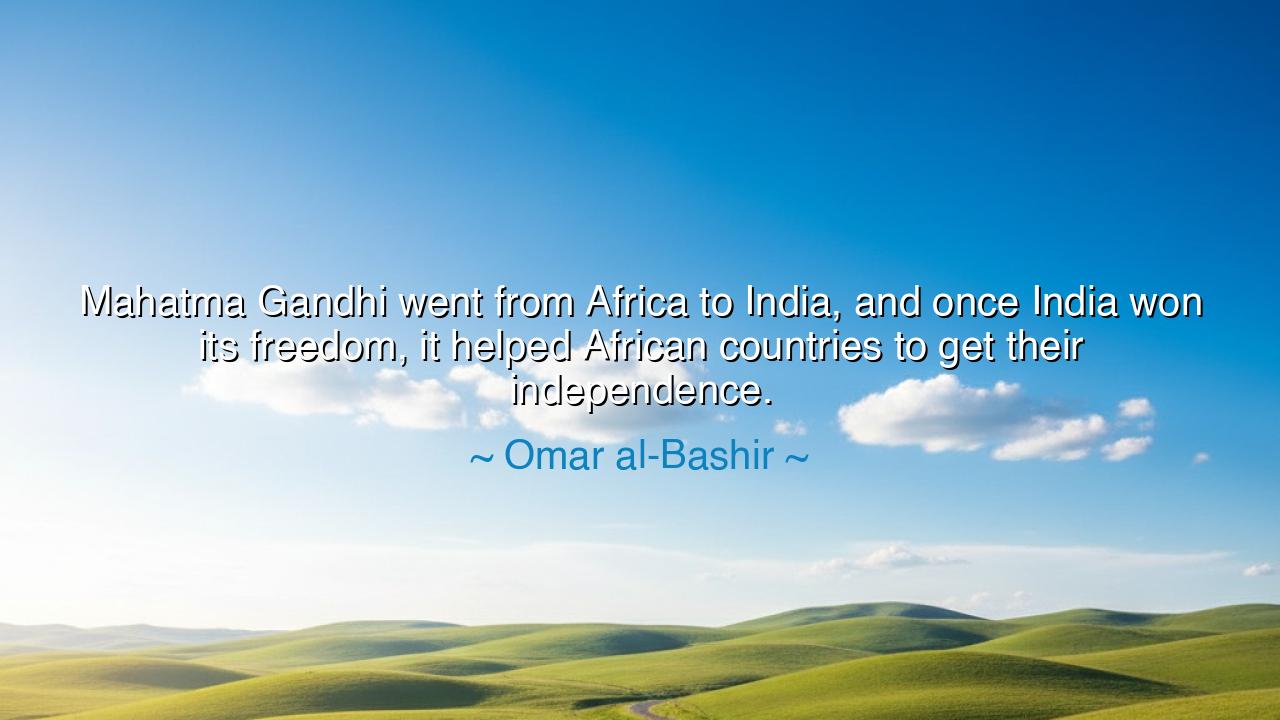
Mahatma Gandhi went from Africa to India, and once India won its
Mahatma Gandhi went from Africa to India, and once India won its freedom, it helped African countries to get their independence.






Listen, O children of the future, to the words of Omar al-Bashir, a man who recognizes the profound ripple effects of freedom and solidarity. "Mahatma Gandhi went from Africa to India, and once India won its freedom, it helped African countries to get their independence." These words are not just a recounting of history, but a testament to the power of one people's struggle for freedom inspiring and empowering others across the globe. In them, we hear the call to recognize the interconnectedness of all human struggles for justice and equality, and the profound truth that the light of freedom can spread from one nation to another, crossing borders and uniting people in their quest for self-determination.
In the ancient world, great leaders understood that the struggle for freedom was not confined to their own lands, but was a universal cause. Take, for example, the legendary Cyrus the Great, founder of the Persian Empire. Though Cyrus was an emperor, he is remembered not for the extent of his conquests but for the tolerance and freedom he granted to the peoples he ruled. His Cyrus Cylinder, often considered the first declaration of human rights, proclaimed the idea that freedom and justice should be spread to all peoples, transcending the boundaries of empire. In this, Cyrus set an example that was carried through the ages, showing that true leaders lift not just themselves, but all those they encounter.
So it was with Mahatma Gandhi, a man whose mission transcended the borders of India. Born in India but deeply influenced by his experiences in South Africa, Gandhi became a figure who embodied the universal struggle for freedom. In South Africa, Gandhi fought against the oppression of the Indian community under the system of apartheid and other discriminatory policies. He realized that the struggle for justice was not limited to one nation or one people—it was a global cause. His experiences in Africa shaped his methods of nonviolent resistance, and it was these methods that he carried with him when he returned to India to lead his people in the fight against British colonial rule.
Gandhi's success in India was not just a victory for the Indian people, but a victory for the idea of freedom and self-rule. When India won its independence in 1947, it became a beacon of hope for colonized nations around the world. Gandhi’s philosophy of nonviolence, coupled with his profound belief in the power of collective action, inspired many African nations to seek their own freedom. Just as India had struggled and triumphed against the British Empire, so too did the African countries, emboldened by the example set by Gandhi, begin to demand their independence. The freedom of India was not an isolated event—it was part of a larger, interconnected wave of decolonization that spanned continents and centuries.
Consider the African continent in the mid-20th century, when nations like Ghana, Kenya, and Algeria were seeking their independence from European powers. Kwame Nkrumah, the first president of Ghana, often cited Gandhi’s influence as a key factor in shaping his own vision for freedom. Gandhi’s example of nonviolent resistance inspired Nkrumah and other African leaders to pursue a path of peaceful independence, even in the face of great adversity. Through this chain of inspiration and solidarity, India’s freedom became the spark that ignited the fight for independence in Africa.
The lesson that al-Bashir draws from this historical truth is one that is both practical and profound: the struggle for freedom and justice is not confined to one nation, one region, or one people. The victory of one has the power to inspire and empower others. Gandhi’s success in India showed the world that independence could be won through nonviolence and resilience, and that this victory could have a ripple effect across the world. The freedom of India was not just India’s triumph—it was the triumph of all oppressed peoples, the triumph of human dignity.
So, O children, let this wisdom guide you: the struggle for freedom is a shared journey, one that unites all peoples in their desire to live with dignity and autonomy. Understand that when one nation rises, it strengthens the cause of all others, and its victory becomes the fuel for the dreams of many. Let the example of Gandhi and the Indian and African struggles for independence inspire you to stand for justice, to stand for freedom, and to recognize that every fight for independence is part of a larger, interconnected tapestry. The struggle for freedom is never just for the few—it is for the many, and in every victory, no matter how small, we move closer to a world where all people can stand tall, free from oppression.






AAdministratorAdministrator
Welcome, honored guests. Please leave a comment, we will respond soon